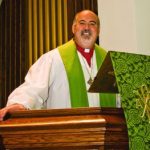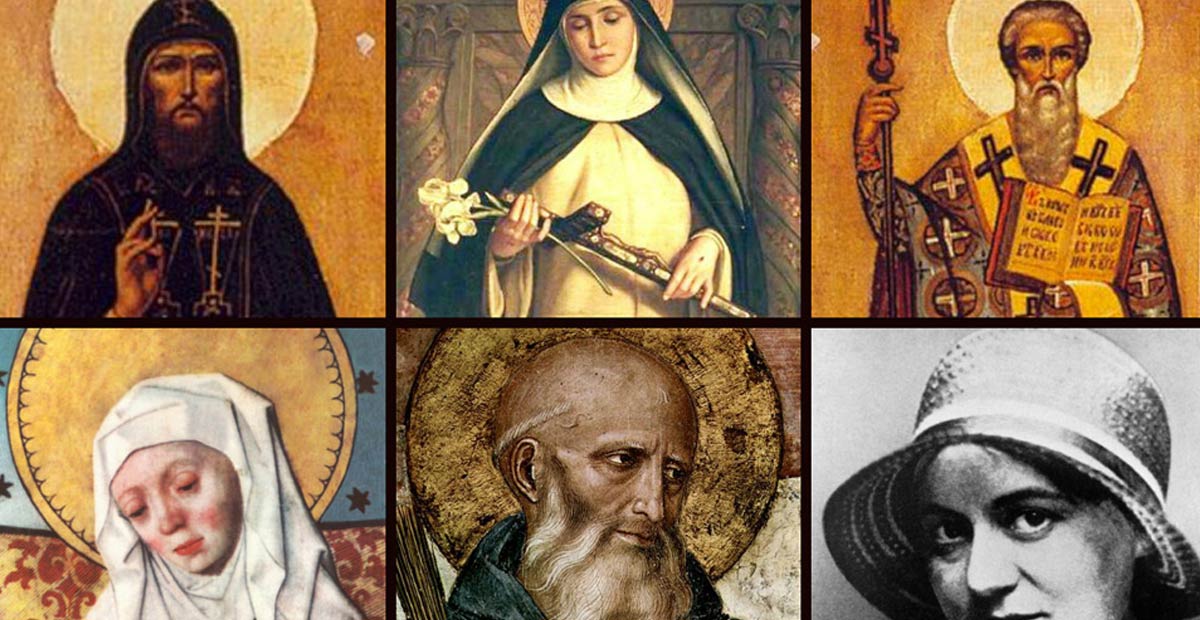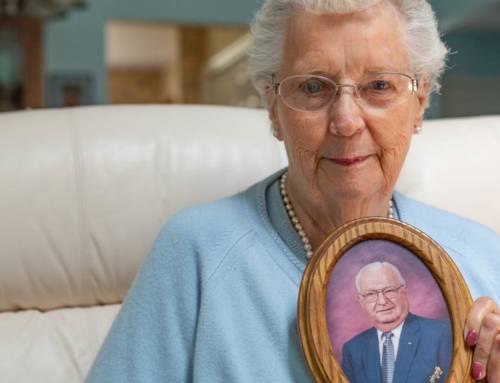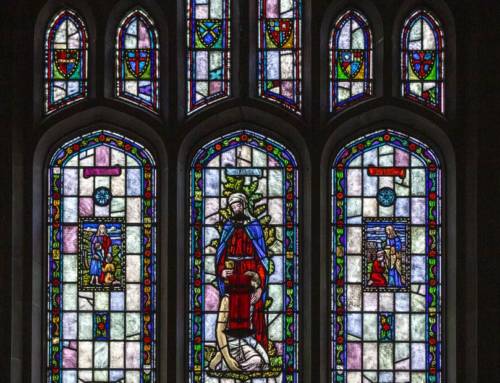
About the Author: Sunday Sermons from Sell Chapel are written by Rev. Preston Van Deursen, Director of Pastoral Care at the Masonic Village at Elizabethtown.
Chicago newspaper columnist Bob Greene writes about a ten-year-old girl named Sarah Meyers whose grandfather had died. Sarah’s mother said, “He hadn’t been feeling well for sometime. He went to the hospital for some tests. Just to find out what was wrong.” He died two weeks later. Sarah was not able to go to the hospital to see her grandfather before he died. She never got the chance to say good-bye. “Sarah saw him regularly, because we live close to where he lived,” her mother said. “This was her first experience with death. We could tell that, as upset as she was, she was additionally upset that she didn’t see him in those days before he died. She didn’t get to have one last talk with him.”
Sarah didn’t say much about what she was feeling. One October day she came home from a friend’s birthday party with a helium balloon. “She went into the house,” her mother said, “when she came back out, she was carrying the balloon – and an envelope.”
Inside the envelope was a letter she had written to her grandfather. The envelope was addressed to “Grandpa Bernie, in Heaven Up High.” In the letter, Sarah wrote: “Hi, Grandpa. How are you? What’s it like up there?” The letter ended with Sarah telling her grandfather that she loved him, and that she hoped somehow he could hear what she was telling him.
In mid-December a letter arrived, addressed to “Sarah Meyers and Family.” The letter bore a York, Pennsylvania, postmark and had been mailed by a man named Donald Kopp.
The letter began: “Dear Sarah, Family and Friends,
“Your letter to Grandpa Bernie Meyers apparently reached its destination and was read by him. I understand they can’t keep material things up there, so it drifted back to earth. They just keep thoughts, memories, love and things like that.”
Donald Kopp found the balloon with the letter attached while he was hunting and hiking near the Pennsylvania/Maryland border. The balloon traveled almost 600 miles from Illinois through four states before resting in the south central Pennsylvania forest.
Sarah said, “At night I would think about it. I just wanted to hear from Grandpa somehow. In a way, now I think that I have heard from him.” Donald Kopp is a sixty-three-year-old retired receiving clerk who just happens to be a grandfather too.
Today we remember those “saints” who have gone on to glory. We give thanks for the contributions they made to our lives. Who are these saints? Frederick Buechner says: “I mean saints as men and women who are made not out of plaster and platitude and moral perfection but out of human flesh. I mean saints who have their rough edges and their blind spots like everyone else, but whose lives are transparent to something so extraordinary that every so often it stops us dead in our tracks.” Think about those words for a moment ” “whose lives are transparent to something so extraordinary that every so often it stops us dead in our tracks.”
SAINTS ARE ORDINARY CHRISTIANS WHOSE LIVES REFLECT THE LIFE OF CHRIST.
Jesus was teaching one day among a great number of people, ordinary people like you and me. In the crowd that day were people who were sick, people who were poor, people who were looking for relief from their problems. Looking over the crowd, Jesus said, “Blessed are you who are poor, for yours is the kingdom of God.” The poor are forgotten, nameless people, even today. We are much more fascinated with the life-styles of the rich and famous. But Jesus doesn’t forget them. He called them blessed.
Then he turned to the hungry and those who weep. He called them blessed as well. In the coming kingdom those who are hungry will be filled, he said, and those who weep will be filled with laughter. His words gave hope to people who felt there was nothing at all to look forward to.
Then Jesus spoke a special word to his followers. He said, “Blessed are you when people hate you and when they exclude you.” Jesus knew the Good News upsets people, it puts them on edge. Jesus knew that down the road it would be tough going, not only for his disciples but for everyone called by his name. Jesus spoke words of hope. When those things happen ” and they will happen – Jesus told his followers, “Rejoice in that day and leap for joy, for surely your reward is great in heaven.” On this All Saints’ Day we honor all those who have been persecuted for righteousness’ sake.
ON THIS SPECIAL DAY WE REMEMBER THOSE ORDINARY PEOPLE OF EXTRAORDINARY COMMITMENT.
We remember those special people who have meant so much in our faith development – Sunday School teachers, pastors, close relatives, mothers and fathers.
Leo Buscalgia remembers and give thanks for his father. He writes: “Papa has been dead for years, but my hallways still resound with his footsteps, his laugh, and the lilt of his speech. His special glow emerges from the memories of secret places and often causes me to pause and picture him as he was.”
Leo Buscalgia remembers the last time he was with his father. They were walking on the sand near the ocean at Waikiki. His father “looked old and tired, and his brisk walk was by now a slow, pained gait.” As they were walking along the shore, writes Buscalgia, “I had an uncontrollable urge to stop right there and take him into my arms and hug him. But Papa, always the nurturer, spared me the trouble. He stopped and reached out to me, took me into his arms and spoke the very thoughts I wanted to express. ‘Don’t be sad,’ he said. ‘We’ve had a nice life together.'”
We remember those special persons and give thanks to God for the privilege of walking beside them and for their positive influence in our lives.
ON THIS ALL SAINTS’ SUNDAY WE ALSO ACKNOWLEDGE THAT WE BUILD UPON THE FOUNDATIONS THEY LAID. The disciples spent the better part of three years traveling around with Jesus. After Pentecost it was time for the disciples to put the teachings of Jesus into practice. They were the ones responsible for spreading the Good News “in Jerusalem, in all Judea and Samaria, and to the ends of the earth.” We follow in those special footsteps.
Every generation has the joy and the responsibility of transferring the message of Jesus Christ to the next generation. The apostles spread the message of salvation to the next generation, and that generation spread the Gospel to the next and so on for twenty centuries. We didn’t come to Christian faith all by ourselves. We build on a foundation that has taken twenty centuries to construct.
Former Surgeon General C. Everett Koop writes in his memoirs of his desire to attend medical school. “As I prepared for my career as a doctor, there was one thing I knew for sure. I would attend medical school at Columbia University’s College of Physicians and Surgeons. When I went to Columbia for my admissions interview in the fall of my senior year at Dartmouth, I felt very much at home…It was inconceivable that I would not be admitted. My discussion with the admissions panel seemed to go well until one of them asked me, ‘Do you ever expect to make any major discoveries in medicine?’
“It was a stupid question then; it is a stupid question now,” Dr. Koop writes. He answered the question like this, “Well sir, from what little experience I have in reading about discoveries in the field of medicine, I rather think that those who make them are building upon the efforts of many who preceded them, but did not do that final thing that achieved success and fame. I would like to be the one who makes a major discovery, but I will be content to contribute to the process.”
“We don’t think you’ve got the stuff we are looking for at the College of Physicians and Surgeons!” the admission interviewers said. Dr. Koop was devastated. But he still feels that he gave a good answer.
On this All Saints’ Sunday we remember those ordinary people who have lived out their lives in Christ-like love. We acknowledge that we are but building on the foundation they laid.
IF WE ARE GOING TO BUILD ON THAT FOUNDATION, HOWEVER, WE TOO, ARE GOING TO NEED TO BE ORDINARY PEOPLE OF EXTRAORDINARY COMMITMENT AS WELL.
When Dr. Fred Craddock returned to his hometown in Tennessee to care for his terminally ill sister, he had the occasion to visit a friend’s church. It was Sunday evening and Dr. Craddock wanted more than anything to go to worship. Most churches in the area did not offer Sunday evening worship. There were churches which had the youth playing volleyball, but he wanted to go to worship.
A friend suggested that he attend his church ” they had a Sunday evening vesper service. Dr. Craddock had not been in that church since his youth. When they arrived the evening sun was shining through the stained glass windows. He asked his friend, “You have new windows?”
“Yeah,” his friend replied, “Aren’t they beautiful?” They were beautiful. Dr. Craddock thought, “This is a little church, how could they afford them?” Then he looked at the names on the windows.
“I grew up here and I didn’t recognize any of the names.” Usually church windows are named for families that have been in the church for years, but he did not know a single family.
His friend answered, “Well, there was a church up in St. Louis that ordered new windows from a company in Italy. When they got there they were not the right size so instead of shipping them back the company said, ‘try to sell them’ while they made new ones. They advertised them and we went up there and bought them.”
Dr. Craddock then asked, “Are you going to put nameplates on them for folk in this church?”
“We took that up at the board meeting,” his friend informed him, “and decided to leave those names there.”
“Why?” asked Dr. Craddock. The friend replied, “It’s good for our church to know that there are a lot of saints in God’s kingdom that we don’t even know.”
I want to be counted in that number, don’t you? I want to be among those ordinary people of extraordinary faith and love. No one may ever know our names. But Christ will know. Just as he knows who’s poor, who’s hungry, who’s grieving, who’s persecuted for righteousness’ sake. He knows and will call our name ‘blessed’.




